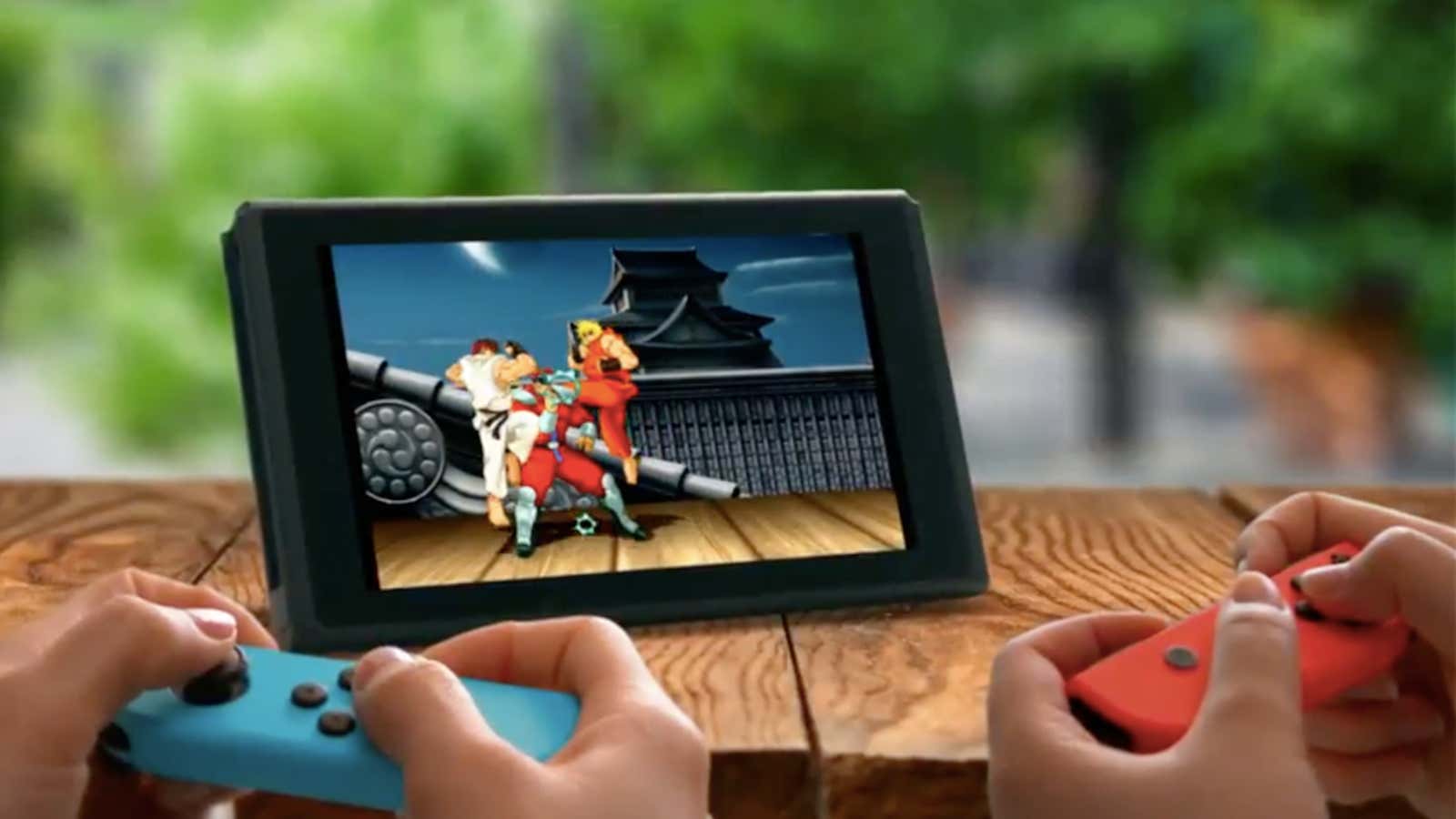Nintendo shareholders aren’t impressed with the company’s attempts to switch it up.
The Kyoto-based gaming giant today announced that its upcoming hybrid console, the Nintendo Switch, would hit store shelves on March 3 and sell for $299. Almost immediately its stock price dropped, suggesting investors don’t believe the device will spare the company from a shaky future.
During an hour-long presentation in Tokyo, the company confirmed that the Switch would be playable in three ways: as a mobile device, a tabletop device, and a home console that connects to TVs. For the latter two options gamers can use detachable controllers called “Joy-Cons.” They closely resemble the motion-sensor controls that made the original Wii console a hit—over a decade ago.
Executives highlighted two upcoming offerings that make good use of the Joy-Cons. The first, 1-2 Switch, is a collection of movement-based mini-games that can be played without looking at a screen, allowing for more face-to-face interaction. The second, called Arms, is a boxing game that lets players throw virtual punches with their own bodies.
The company also showed previews for Super Mario Odyssey (a new Mario title) and Zelda: Breath of the Wild (another update of a classic). No launch dates were given.
Nintendo added that the Switch will come with an online subscription service letting users download and pay for games on a rolling basis—something the company has been relatively late to implement compared to its peers.
It also mentioned an online gaming network that would let users play with friends and chat online—again, a feature that’s long been available on competing consoles, though it’s new to Nintendo.
Worse still, at about $300 the device will be more expensive than the latest consoles from Sony and Microsoft. A Sony PlayStation 4 selling for about $270 with free shipping in the US is not hard to find. The same goes for an Xbox One.
None of this excited investors. The stock opened in Japan slightly lower than its previous close as rumors spread about the device’s price. When the company confirmed the price during the presentation, Nintendo’s share price fell further. The stock closed down 5.75% from the previous day.
Daniel Ahmad, a games industry analyst at research firm Niko Partners, thinks the console’s price will do little to excite potential customers, who are already accustomed to online services from competitors and will likely be unimpressed by the Joy-Cons.
“At this price the console may have a tough time competing with new buyers who are looking for a complete home console experience,” he said.
Nintendo sorely needs to revamp its business model to adjust to industry changes. As average consumers continue to get their gaming fix on smartphones instead of home consoles, the company has been cornered. Sony and Microsoft have maintained healthy sales by appealing to hardcore gamers. But Nintendo’s forte has always been casual gamers—the exact group most likely to ditch an expensive home device for a free download of Flappy Bird on their smartphone. This is problematic for Nintendo—the company makes almost all of its revenue from consoles and the games played on them.
Nintendo did broaden its horizons last year. It launched two smartphone games based on famous characters: Pokémon Go and Super Mario Run. The former was a smash hit, but Nintendo must share the revenues with app stores, co-developer Niantic, and a licensing firm called the Pokémon Company that Nintendo has a stake in. Super Mario Run attracted a surge in downloads for a basic free version, but it quickly fell from the list of top-grossing games in the Apple App Store, suggesting few players were willing to shell out $10 for the complete experience.
Today’s drop aside, Nintendo’s share price remains roughly at the levels it surged to once Pokémon Go caught fire. But if neither mobile games nor the Switch lead to stronger top-line revenues, the company’s mid-2016 surge could get wiped out, and the company will have to think more deeply about its business model.
